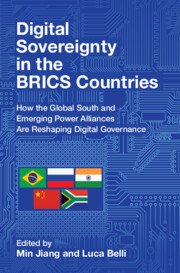Acknowledgments
The seeds of this book project were sown in 2018 when the CyberBRICS Project was initiated by Luca Belli as the first research initiative dedicated to exploring digital policies in the BRICS countries. It has since been hosted by the Center for Technology and Society at FGV Law School, Rio de Janeiro, Brazil.
Since the inception of the project, the FGV Rio Law School and particularly its Dean, Professor Sergio Guerra, have been constantly supportive, understanding the incredible potential of this unique project. We would like to thank FGV and CyberBRICS supporters to promote invaluable and innovative research on some of the most pressing digital issues in leading emerging economies, which were enormously underexplored previously. The CyberBRICS project is proud to have established a new network of Global South leaders and scholars, driven by their interest and passion for digital governance from the perspective of the Majority World with a platform for collaborative research.
Min Jiang joined the CyberBRICS Fellowship Program as a China fellow in 2019. She is grateful for the support from Luca and her former Dean, Dr. Nancy Gutierrez, who saw the CyberBRICS project’s potential and encouraged building international connections. Having collaborated on the book CyberBRICS: Cybersecurity Regulations in the BRICS Countries published by Springer in 2021, Min and Luca reunited for a new endeavor focused on the digital sovereignty debate and, more broadly, digital governance in the Global South. Min wrote about Chinese internet sovereignty a decade prior. Over time, many digital sovereignty issues persisted and have become more intertwined with cybersecurity and other digital governance issues. A new project was needed to explore how BRICS countries were shaping their digital sovereignty and digital governance narratives and initiatives.
We are particularly proud that this book project is truly global and interdisciplinary in nature with contributors spanning all six continents of Africa, Asia, Oceania, Europe, North America, and South America crossing disciplinary boundaries of communication studies, law, political science, international relations, as well as language and cultural studies. This diversity is not only a reflection of the growing international interest of the BRICS alliance and the “rise of the rest” that it represents but also the global relevance and importance of the digital sovereignty debate. We are especially grateful for the faith our authors placed in the collective endeavor as well as in us as coeditors as we continuously improved the book for almost three years. The hard work, insight, feedback, advice, and support we received from this vibrant scholarly community is inspiring. We would like to acknowledge their excellent work and warm friendship.
Our partners at Cambridge University Press deserve our heartfelt special thanks. Dr. Lance Bennett, book editor for the “Communication, Society and Politics” series, took an immediate interest in this project and helped us sharpen our arguments, thinking, and composition of the book. Ms. Rachel Blaifeder, our Cambridge editor, is another wonderful sounding board who shepherded us through the entire publishing process with care and grace., Mses. Jadyn Fauconier-Herry, Chloe Quinn, and Swati Kumari also attended to every publishing detail with expediency and professionalism. The three anonymous reviewers also provided us with sharp critique and wise feedback that helped us improve our book a great deal. We are thankful to have worked with such a stellar team at Cambridge University Press.
Also hardworking behind the scene are many of our colleagues, friends, and research assistants. Leah Woehr and Kristen Zhang, who were Min Jiang’s research assistants while M.A. students at the University of North Carolina at Charlotte and who have gone on to pursue their doctoral degrees, helped with copyediting and indexing of the book manuscript. Eduardo Brasil, Nibin Babu, and João Pedro Demambro, research assistants of Luca Belli, have provided valuable editorial support.
Finally, we want to thank the institutions that provided financial support for the book to be open access to all. CTS-FGV provided the majority of the funding for this effort, thanks to the generous contributions it received from the Open Society Foundations and the Ford Foundation. Atkins Library and the College of Humanities, Earth and Social Sciences (CHESS) at the University of North Carolina at Charlotte (USA) also offered to cover the cost of open access with facilitation from Associate Dean for Collection Services at Atkins Elizabeth Siler and CHESS Interim Associate Dean for Research Beth Whitaker. Paris Lodron Universität Salzburg (Austria) covered the remaining open-access funding needs with help from Drs. Tales Tomaz, Josef Trappel, and Ursula Schachl-Raber.
A book of this scope could not have been done by us two alone. We are deeply grateful for the community and support that have nurtured it to fruition.

